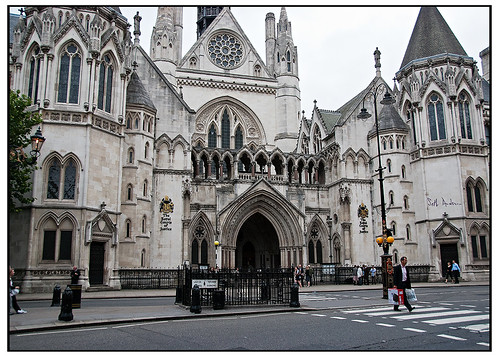
Circuit Court of Cook County
Seems like our litigious society has consequences, and not all good. If we stopped prosecuting low level drug offenses, our overcrowded courts could clear their glut a bit. Maybe there should be a five year moratorium on prosecuting marijuana offenses regarding amounts less than an ounce? Try it, see if the dockets clear up a bit…
An explosion of criminal prosecutions in the nation’s overextended federal courts has left civil litigants from bereaved spouses to corporate giants waiting years for their day in court.
The logjam, prompted particularly by criminal cases related to drugs and immigration, as well as by the proliferation of more-obscure federal criminal laws, threatens the functioning of the nation’s judicial system, say some judges and attorneys.
…
Over the past three decades, the U.S. has steadily added to the federal rule book through new criminal statutes and regulations that carry criminal penalties. Combined with beefed-up enforcement, that has led to a 70% jump in the number of pending federal criminal cases in the past decade—to over 76,000, according to the Administrative Office of U.S. Courts.
Civil litigation, which accounts for over three quarters of federal court cases, is getting squeezed the most. In 2007, fewer than 7% of civil cases were more than three years old. By last year, that percentage more than doubled, with nearly 45,000 cases in a holding pattern.
(click here to continue reading Criminal Case Glut Impedes Civil Suits – WSJ.com.)

Combination Post Office and Court House in Sitka, Alaska.
It doesn’t help that appointing judges to the bench has become part of our toxic partisan political system
Exacerbating the problem are vacancies on the federal bench. Despite the surge in case loads, the number of authorized federal judgeships has risen just 4% since 1990. Of the 677 district court judgeships currently authorized, about 9.5% are vacant.

Cops on Bikes
and these are just tickets, but still, to my mind this mentality is part of the problem:
A record number of drivers were issued cellphone violation tickets in Chicago for not using hands-free devices last year, translating into millions of dollars in revenue for the city, according to figures obtained by the Tribune.
And because of a change in the way those tickets are processed, the city doesn’t have to offer a cut on most of those fines to the state or Cook County, resulting in a loss of revenue for them, the newly released data show.
…
In 2010, Chicago police issued 23,292 tickets for using a cellphone while driving, the highest number of citations handed out in a single year for the offense. The number is a 73 percent increase from 2006, the first full year that the city’s cellphone law went into effect. The 2010 tickets brought in $2.2 million for the city, data show. The figures indicate the city has become more aggressive in issuing the violations, which are difficult to fight and come with a hefty fine that has increased from $50 to up to $500 in just five years.
“It’s pay short money now or pay long money later,” said Alvin Wooten, 42, a South Sider who has gotten two cellphone tickets and chose to pay the fines rather than face higher ones by contesting them.
(click here to continue reading Record number of drivers given cellphone violation tickets in Chicago – chicagotribune.com.)
Every little societal change involves laws, and enforcement of laws to change behavior. Some I can see (cellphone usage does impair driving), but not all…





